19th September 2024 In Emerson Stories, Feature By Adeline Garman
This is Happy Week – Lifeways at Emerson
A young boy looked rather quizzically at a member of Emerson staff and after a brief pause
offered his verdict on Lifeways:
‘This is happy week’…..
he smiled, before scuttling off to join his newfound friends.
Oral tradition has it that Lifeways came into being when John and Gudrun Davy were met by
members of the peace movement arriving at Emerson with tents and camper vans. Many were
families, which Emerson were not expecting and were not prepared for. John Davy appealed
to Gudrun:
‘Do something with these children!!’
She did, and the seeds of Lifeways were planted.
Since then the annual Lifeways conference at Emerson has grown and thrives, carefully
tended by a dedicated succession of leaders and planners using a winning formula of a wellplanned
daily rhythm with something appealing for all ages and talents. The contributors
come from very varied walks of life offering their skills, knowledge and experience as
volunteers. Lifeways unites them. It’s a big event, with usually over 200 people, aged
between near zero to over 80 coming from as far away as Japan and as near as Forest Row.
Some have literally ‘grown’ with Lifeways – starting as a toddler in one of the parent and
child groups, and ending up as camp leaders and on the committee that currently organises
the event.
For adults and young children the day starts with breakfast and then a steady stream of
participants make their way up the steps and across the bridges to sing ‘Lifeways’ songs
together. A touch of warming up and then we’re led into singing old favourites in rounds and
tempted into trying something new. A pause brings news of what has been happening on the
camp the night before, an outline of the day and what we expect from the weather. Regular
calls to return cups to the kitchen so they don’t run out is a common theme.
For the children on camp the days start with preparing breakfast and lighting the fire that
heats the water for the washing up. The camp hot water system is an evolving installation of
art, technology and recycling. An old radiator, bright blue plastic tank, bricks and lots of
pipes and scaffolding mean that the campers enjoy team working and survival skills. They
collect and chop wood, scavenge dry paper and cardboard and learn how to manage fire. Real
saws and axes, real matches, real fire, real scalding water and real washing up!! Don’t worry
the risk assessment is done and a large notice on the tank above our heads says ‘HOT’.
Then the morning activities begin in earnest, with a wide ranging selection of workshops for
adults and age-appropriate activities for the children. They were chosen at registration on the
Sunday afternoon, and offer a good balance of ‘thinking, feeling and willing’ activities, or
‘education for head, heart and hand’ which inspires the many leaders who work with the
principles of Waldorf Education. It’s fascinating to assist participants and their children with
choices. Many cannot remember what they chose months ago when they booked, and others
have come to Lifeways specifically for a particular group and have been on a waiting list for
a couple of years. Craft in the morning and conversation in the afternoon? Or would
conversation in the morning and craft in the afternoon be better for you? Maybe venture into
something completely new, or relax into the familiar? The clinching thing might just be
joining a friend who arrived early and is already booked in for something. We are, after all,
going to be one big family for the week moving forwards together with the ‘weaving waves
of time’, hand in hand with our physical and spiritual companions.
By coffee time we are all on our way with the chosen activities – maybe making a basket,
composing a story, learning about the complex rhythms of life and the stars, delving into
hidden secrets in the world or discovering something within ourselves that we never knew
was there. It’s all ‘Anthroposophy in action’ held together by the theme for the year.
Then suddenly it’s coming up to lunch time. Time for parents to collect the younger children
and hear about what they have been doing over a beautiful meal cooked by inventive staff
from many different countries, using ingredients from the Emerson biodynamic Garden and
local farms.
A short break follows, then it’s a rich and varied selection of afternoon workshops for adults
and activities specifically designed for children. There are the ‘old favourites’ such as candle
dipping and energetic games enjoyed every year by the younger participants. Like me, many
adults are mystified by the ‘rules’ of ‘storm the castle’… but the children have no problem!
At 4pm it’s time for tea and ice cream on the lawn. Parents scan the lawn for their children,
wanting to know how they are coping with camping, and children scan the lawn for their
parents, wanting money for ice cream. When they meet the exchange is often in favour of ice
cream, and well summed up in the words of a young teenager new to Lifeways:
‘I don’t do worried parents.’
The bell summons the campers back through the trees to the camping field, and the adults to
a rest, a chat, or attendance at ‘Marketplace’ where participants are invited to talk about
something that inspires them.
Then it’s time for supper, followed by bedtime for the younger children and the opportunity
to hear an inspiring talk on an Anthroposophical theme for the adults.
But the day is not over QUITE yet !!!
If the weather is good and the sky clear then there is a chance to walk down the road a bit, lie
on our back in a field, and be given an inspirational guided tour of the sky above us –
complete with a telling of the myths and legends that have thrilled and informed humanity for
many, many generations.
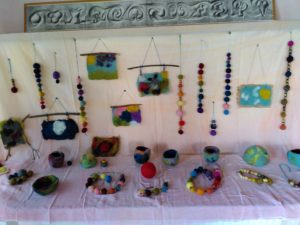
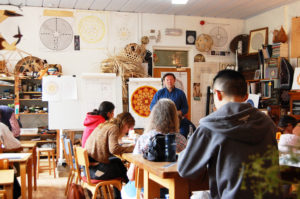
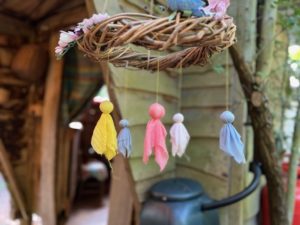
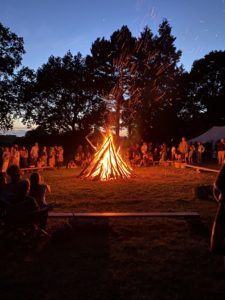
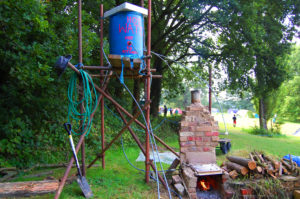
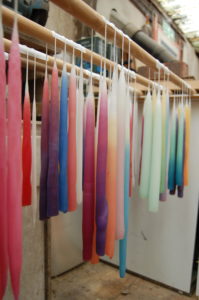
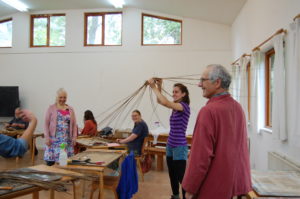
Then, with the image of the stars in our minds, it’s bedtime. In the camp the campers are
(hopefully) snoozing in their tents, and the camp leaders are spreading their sleeping bags out
under the stars next to the fire.
Each day brings its special events and challenges. As the crafts develop and our experience of
the workshops deepens there are puppet shows, camp open afternoon, an evening of talent
offered by participants, dancing and singing round a fire that has been built for us all by the
campers. And if you are REALLY daring you could try putting your swimming gear on and
joining the campers as they go down the water slide at the camp open day.
A good thing about Lifeways is choice. If you choose rightly (for you) there is the possibility
of spending a week in serious Anthroposophical Study in morning and afternoon groups,
supported by good company and the beautiful grounds of Emerson. Or there is the possibility
of spending the week crafting and painting, getting ‘out of your head’. Or anything between
those two extremes.
On the final morning, we end with the Lifeways ‘harvest’. Groups come to the stage to show
everyone what they have done, and the rooms lights up with paintings, candles, baskets, felt
work, and woodwork. The campers join us to show what they have been up to, often singing
songs they have written that sum up the week. Then the younger children come in, dressed in
their newly tie dyed T Shirts caring things they have made, and the whole of Lifeways joins
in thanking the staff who walk up the steps bringing in the tools of their trade – cooking pots,
enormous whisks, wheelbarrows and brooms. We love them!!
We end with a song ‘Hark, the Lifeways bells are ringing….’ and assemble on the lawn for
the last lunch of Lifeways before making our way back to ‘real life’ enriched by our time
together. Lives are often transformed, and lifetime friendships begun during the week,
witness the frantic exchanges of phone numbers and emails.
If you’d like to join us then do make a note of next year’s dates (July 20 – 26). You can ensure you’re one of the first to hear when booking opens by adding your details to this form. And if you want to be sure
of participating in your first choice of workshops – book early!!
Sue Peat
For the Lifeways team (Florrie Cassell, Yvette Dellsperger, Louis Lines, Sue Peat and Ted
Prestbury)
This article was originally published in ASinSussex Newsletter in Autumn 2024 and is reproduced here with kind permission.

